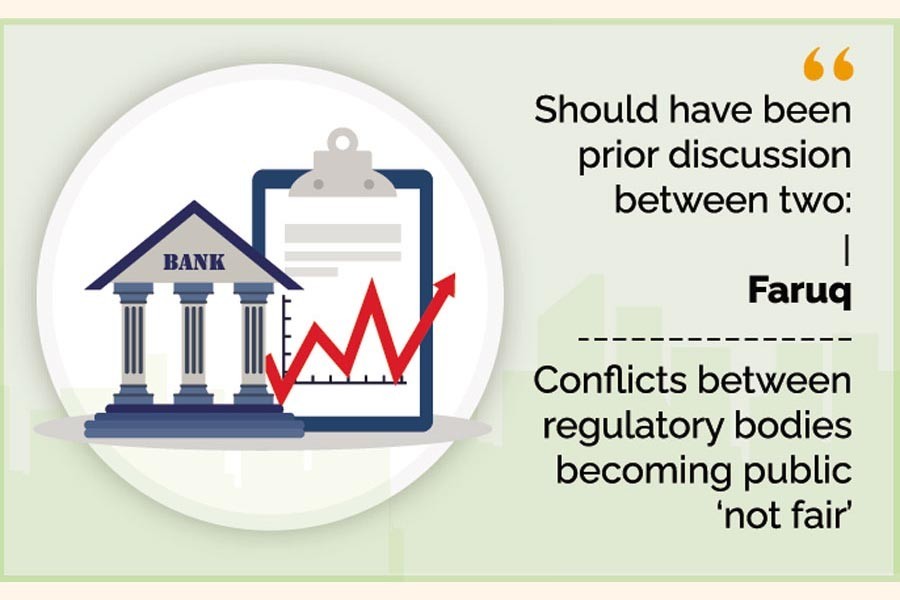Only a day after the central bank opposed the use of undisbursed dividend of banks and non-banking financial institutions by the capital market Stabilisation Fund (CMSF) in stock trading, Finance Minister AHM Mustafa Kamal on Tuesday endorsed the securities regulator's stance.
"The BSEC [Bangladesh Securities and Exchange Commission] decision is a government decision," he said.
"I don't believe that the securities regulator [BSEC] will [do] anything bypassing government decision," he told reporters after the day's meeting of the Cabinet Committee on Public Purchase.
The finance minister, however, said the central bank has role [in this matter].
"Both should work together."
The central bank during a virtual meeting of major regulatory bodies on Monday last claimed the BSEC decision to transfer unclaimed dividends of banks and NBFIs contradicted provisions of Bank Company Act.
The Dhaka Stock Exchange DSE) main index lost 77.55 points on Tuesday after a long rally. Market insiders listed the conflict between two regulators as on the reasons for some nervousness among the investors.
In July, the BSEC formed the 10-membmer CMSF headed by former Principal Secretary Mr Nojibur Rahman, as a measure of balancing the stock market against volatility in the wake of a resurgence of the market after reopening from corona lockdowns.
But the Bangladesh Bank Monday announced a bar on use of unclaimed or undisbursed dividends of banks and non-banking financial institutions for investment under the CMSF jurisdiction. The central bank argued that the restriction is aimed at protecting the depositors' interests, and that the unclaimed dividends are actually part of deposits.
The finance minister noted that there is a guideline or directive as to how to disburse dividend and bonus to the investors.
"There is a detail about disbursement of stock and bonus shares by the listed companies," he said, trying to talk off the standoff between the two regulators.
The BB also ruled out disbursement of dividend despite incurring cumulative loss by banks and NBFIs, in line with the BSEC notification.
Earlier on October 02, 2019, the BSEC had issued a notification allowing all the listed companies to disburse dividend despite counting cumulative losses.
However, central bank officials say the CMSF, issued by the BSEC through a gazette notification on June 27, has contradiction with the existing Bank Company Act 1991.
As per the Bank Company Act, the central bank will be recognised as civil court for the purpose of unclaimed deposits in any liabilities forms, according to the BB officials.
Quoting the Bank Company Act a BB official said: "Any payable amount will be considered deposit."
The securities regulator had issued rules for the CMSF aiming to facilitate the country's stock market alongside settling investors' claims on undistributed or unsettled dividends.
Earlier, the BSEC disclosed Tk.210 billion of undistributed and unclaimed dividends by the listed companies, which it now plans to use as the safeguard for the capital market and its general investors.
Many listed companies have already initiated moves to transfer unpaid or unclaimed dividends and non-refunded IPO-subscription funds into the CMSF.
Former chairman of the securities regulator Faruq Ahmad Siddiqi said any regulator should conduct a prior discussion with another regulator in case of taking any decision if there is any possibility of conflicts between the rules and regulations of those bodies.
"The securities regulator now can come forward to find further solution to the conflict that has already arisen with the central bank. The BSEC will also have to keep it in mind that the central bank is also a regulatory body," Mr Siddiqi added.
"We have been stressing such a policy since 2010. But both the central bank and the securities regulator are not following this policy."
He sees it not fair if conflicts between regulatory bodies become public.
"It also tarnishes government's image. The securities regulator ought to have discussed the issue of Capital Market Stabilisation Fund with the central bank before taking decision in this regard," Mr Siddiqi said.
He suggests the central bank should also keep it in mind that a decision that may leave negative impact on stock market should be avoided.
"It's also applicable to the securities regulator," he says.


